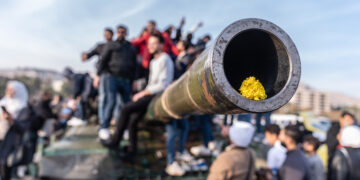(Washington D.C., April 13, 2021) – More than a year and a half after the arbitrary arrest and pretrial detention of Egyptian journalist and politician Khaled Dawoud, prosecutors ordered his release on April 12, 2021, his lawyer said.
Supreme State Security Prosecutor Khaled Diaa el-Din had accused Dawoud of aiding a terrorist group and arrested him on September 24, 2019 but presented no evidence to support the accusation. Egyptian supreme state security prosecutors often accuse political opponents, journalists and rights activists of "terrorism" based on their peaceful speech and activism, which are protected by international human rights law. Dawoud, who has long criticized Sisi's autocratic policies, as well as the autocratic policies of Sisi's predecessor, Mohamed Morsi, was arrested shortly after he called for Sisi to be held accountable in a corruption case related to the construction of Sisi's presidential palaces.
"The Egyptian government has deprived Dawoud of nearly two years of his life for no reason other than his opposition to Sisi's crushing of democracy," said Sari Bashi, Research Director at Democracy for the Arab World Now (DAWN). "In Egypt, the authorities don't need evidence or a trial- they punish dissidents by throwing them in jail and keeping them there."
Egyptian prosecutors, under the supervision of First Attorney of the Supreme State Security Prosecution Khaled Diaa el-Din, ordered Dawoud's detention in Liman Tora Prison, where he was denied communication with his family, including his only son, Basem, and allowed to visit his sick, elderly father, Elsayed Dawoud, just once, after Khaled Dawoud's sister died. Prison officials held him in a tiny cell with two other prisoners and denied him a bed and access to newspapers and personal belongings.
DAWN documented Dawoud's unjust prosecution from the moment he was arrested until his release, shedding light on the officials involved in abusing Dawoud's due process rights. The most prominent of these officials, featured in DAWN's culprit gallery, are: General Prosecutor Hamada Alsawy, who bears overall responsibility for prosecutions; First Attorney of the Supreme State Security Prosecution Khaled Diaa el-Din and Judge Moataz Khafagi, head of the Second Terrorism Circuit of the Giza Criminal Court.
In a clear example of the judiciary's abuse of procedures, Judge Khafagi renewed Dawoud's pretrial detention three times without bothering to allow Dawoud to attend the hearings and make arguments in his defense, in violation of both Egyptian and international law. Khafagi also trampled on Dawoud's right to have the lawfulness of his detention considered on an individual basis – Judge Khafagi renewed Dawoud's detention for 45 days on May 5, 2020, and then renewed it again one day later, on May 6, 2020, as part of a practice of wholesale and automatic detention orders to keep political opponents in protracted and unlawful pretrial detention, without regard for their individual circumstances and without, apparently, bothering to look at the details of the case.
"There was no evidence of any crime, so Judge Moataz Khafagi and Prosecutor Khaled Diaa el-Din used pretrial detention as punishment, sentencing Dawoud to 19 months of mistreatment in prison and separation from his son, ailing father and now-deceased sister," Bashi said.
It was not immediately clear if Dawoud's release was conditional or whether the prosecution would drop its charges against him, which include aiding an un-named terrorist group and misuse of social media. Human rights lawyer Khaled Ali said that the Supreme State Security prosecution ordered his release, and the Egyptian independent newspaper Mada Masr said he was released on bail. Two other activists whom Egyptian authorities arrested together with Dawoud had already been released. Dawoud's release is especially welcome given today's beginning of Ramadan, the month in which Muslim families gather at communal meals.
Tens of thousands of arbitrarily held detainees are still languishing in prisons for their peaceful dissent or their independent journalism. The Egyptian government should immediately release all prisoners of conscience and peaceful political activists. It must respect its obligation to respect and promote human rights as stipulated in the Egyptian constitution and international human rights law. Its judges and prosecutors should stop acting as henchmen for an autocratic, oppressive government. And the United States should stop propping up Sisi's repressive regime with $1.3 billion in annual aid.
Read DAWN's documentation of Khaled Dawoud's arrest and detention.
Read about the culpability of General Prosecutor Hamada Alsawy, Supreme State Security Prosecution head Khaled Diaa el-Din and Judge Moataz Khafagi in his arrest and detention.
In Pictures
Photo Credits: Egyptian journalist Khaled Dawoud speaks during a press conference on the Egyptian opposition ahead of the March 2018 presidential elections, in Cairo on January 30, 2018. – Egyptian authorities have arrested more than 1,000 people, rights groups said on September 25, 2019, broadening a crackdown launched after rare protests calling for the ouster of general-turned-President Abdel Fattah al-Sisi. High profile dissidents have also since been detained, including Khaled Dawoud, a former leader of the liberal Al-Dostour party who appeared in front of state prosecutors on Wednesday, his lawyers confirmed. Dawoud, a well-known politician and journalist, is a senior member of a broad coalition of leftist and liberal opposition parties that called on Tuesday for a "national dialogue" with authorities. (Photo by Mohamed EL-RAAI / AFP) (Photo credit should read MOHAMED EL-RAAI/AFP via Getty Images)





































